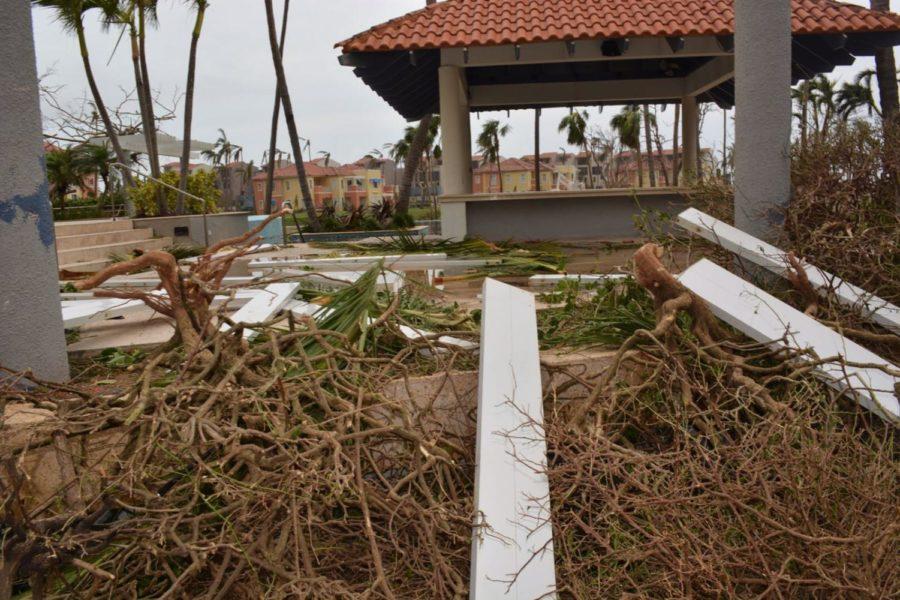Hurricane Maria impacts students at Iowa State
Photo Courtesy Maria Pimentel Diaz
Puerto Rico
September 22, 2017
Laura Pesquera woke up to a startling video posted by her brother-in-law Wednesday morning. The video showed harsh winds, trees swaying from side to side and the beginnings of widespread flooding. Pesquera tried calling her family only to find the lines were down.
Pesquera’s family lives in Toa Alta, Puerto Rico, a city hit by Hurricane Maria Tuesday night.
Pesquera, junior in biology, is one of many Iowa State students with family directly impacted by Hurricane Maria. Electricity is down around the country and isn’t expected to be restored for another six to seven months.
Gas stations sit without roofs. Light posts and trees lay in heaps on the ground. Thousands of houses are flooded or completely destroyed. As photographs were passed across news outlets, Pesquera said people were left to wonder, “Is my family in that mess?”
She was unable to contact her family for over 24 hours. Pesquera had to go through her day-to-day tasks such as taking a physics test and completing homework all while her family was facing a life or death situation.
“I was very overwhelmed with the fact that everything else was normal,” said Pesquera. “So that was scary for me — just to know that we live so far away, it’s really easy to ignore things happening somewhere else.”
Her family finally got through Wednesday evening using a neighbor’s phone. Everyone in her family was safe, but her house had flooded and the stairs had become a waterfall when the drainage system was blocked. At her sister’s house, a portion of the roof was taken off, but they had chosen to stay with Pesquera’s parents during the storm.
“I cried so hard. My family is my everything; I love them to death,” Pasquera said. “I honestly don’t know what I would be without them.”
Many other Iowa State students have experienced similar situations.
Maria Pimentel, sophomore in public relations and political science and member of the Puerto Rican Student Association, is from Humacao, a small town on the east coast of Puerto Rico. Humacao is a short distance from where the eye of storm made landfall in Yabucoa, Puerto Rico.
Pimentel last talked with her family on Tuesday before the phone lines went down. At that time, they were expecting the storm to enter the country a couple towns further south. Her family had decided not to evacuate, convinced that the house’s structure was solid.
She had no contact with them until 11 a.m. Thursday. Pimentel said she burst into tears at the sound of her dad’s voice.
The conversation was short, only two or three minutes before they lost connection again. Her father said they were fine, but the house was flooded. They also asked her to call her grandma to let her know they were alright. She was able to talk to her mom around 5 p.m. Thursday.
They are not trapped, but are choosing to remain inside because of concerns of further rain and falling trees.
Caitlin Gallagher, sophomore in industrial engineering, is from an island near the main land. She finally received news from her best friend after hours of uncertainty. Many people haven’t been as fortunate. Gallagher said she has a friend who still has not heard from her brother.
Gallagher’s grandparents are currently trapped in their apartment, which is on the 26th floor. Flooding up to the second floor has made it impossible for them to leave, but the apartment has sustained minimal damage.
Although the hurricane itself has passed in Puerto Rico, the devastation is far from over.
“I have a lot of friends who didn’t know they were going to be stuck in their houses and don’t have food,” Pesquera said. “They don’t have food that they can eat in the next few days. They are eventually going to run out of things they have in their fridges.”
While Pesquera’s family was prepared, they have divided food and water into rations for the coming days.
Pesquera said the recent Hurricane Irma was the “boy who cried wolf.” Irma was expected to be much more powerful than it was, causing people to dismiss how destructive Hurricane Maria could be. During the last few days before Maria hit, people heard it would be a category four or five storm. There was a panic as people rushed to purchase food and generators.
“I don’t think this generation knew what a horrible hurricane was,” Pesquera said. “It is scary to think it kind of looks like it went from a first world country to a third world country really fast. But I think the Puerto Rican people are really strong, so it doesn’t really matter what happens to them. At the end of the day, they are very resilient.”
A GoFundMe page, GoFundMe.com/studentswithPR, has been set up by Puerto Rican students studying in the U.S. They are from over 25 universities across 15 states working to help with crisis relief. The funds will go to Unidos por Puerto Rico, a public-private initiative.
The campaign was set up by Puerto Rico’s first lady and governor. Iowa State’s Puerto Rican Student Association is asking the community to give whatever they can to help the cause.
















